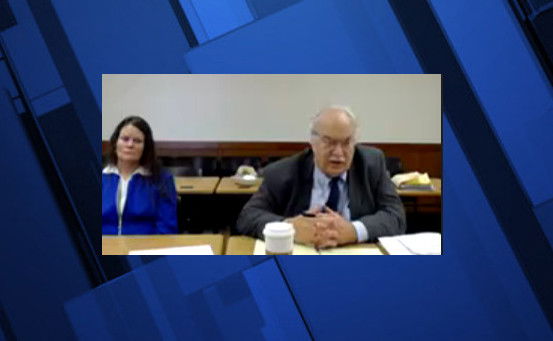State Psychiatric Review Board appears ready to let Bend-area killer leave State Hospital for locked treatment facility

(Board continues hearing for some more information, but release deemed likely)
BEND, Ore. (KTVZ) – Oregon’s Psychiatric Security Review Board appears likely to approve plans for a Bend-area woman who shot and killed a neighbor walking her dogs in 2019 to leave the Oregon State Hospital, which recommended her conditional release to a locked, secure residential treatment facility near Portland.
But first, it wants some questions answered about Joanna Kasner's treatment plan.
After an often-emotional two-hour hearing on Wednesday, "the board found based on the record and the testimony that Ms. Kasner is appropriate for conditional release, with some contingencies," Executive Director Alison Bort told NewsChannel 21 Friday.
But the board continued the matter to July 26, so it can collect more information in two areas, she said.
"The first request is for the current and prospective treatment teams to develop a more specific, written plan in the reportedly unlikely, but possible case that Ms. Kasner’s symptoms of psychosis re-emerge while she is in the community," Bort explained.
The second element the board wants more information on is "to better understand whether there are victims residing in Milwaukie, as it is the Board’s long-standing practice not to place PSRB clients where their victims reside, with some limited exceptions," she said.
The follow-up administrative hearing won't be open to the public, and no more live testimony will be given, Bort said.
"Following that review, there are a few possible outcomes," she explained.
The board could approve Kasner's placement, as proposed at the hearing. It could deny the proposed location and order an evaluation to an alternative placement -- "or they may deny the conditional release in its entirety and find that Ms. Kasner remains appropriately placed at OSH."
But based on evidence in support of conditional release provided at the hearing "and the current breadth and depth of the proposed plan," Bort said Kasner is "likely to be approved for a conditional release to a locked, secure residential treatment facility," after the additional information is provided.
Kasner did not speak at the hearing, held virtually, but her attorney, Harris Matarazzo, and psychiatrist painted a picture of a woman who can be adequately treated and controlled under the proposed treatment plan, one of over 100 exhibits submitted for the board to review.
Dr. Sumrat Sethi said Kasner’s delusional disorder and PTSD are in remission, thanks mainly to therapy and neuro-feedback treatment, although she is not taking medication for either due to severe physical side effects.
“I would say she’s psychiatrically stable at this point,” Sethi said. “She’s expressed extreme remorse for her behaviors and empathy for the consequences of her actions on her victims, not once but many times. I have no reason to believe what she said was not genuine.”
In fact, Sethi said she had been allowed privileges such as leaving the OSH grounds for a “Coffee in the Park” program numerous times. The psychiatrist noted that she’d be in a more restrictive setting than at OSH to start at the Clackamas County treatment facility, where an opening for her is expected in July, and she would have to earn greater privileges.
But Peterson’s distraught family members begged the board not to trust the woman, who they referred to as a “master manipulator.” They had said much the same in talking with NewsChannel 21's Bola Gbadebo in the days leading up to the hearing.
Peterson’s husband, Steve, broke down in his testimony to the board, saying that Kasner "literally just destroyed my life.”
“There’s no reason for her to get out in two freakin’ years!” he said. “She took everything I got.”
Kasner broke down in tears as one after another of her victim’s family spoke or had their statements read into the record about the pain and agony the crime left behind, calling Kasner a danger to the community and society and urging the board to “see through these lies and deceit.”
If she’s indeed any better, they argued, she should go to prison instead.
Assistant Attorney General Kristen Boyd said there was insufficient evidence in the record to show that Kasner could be adequately controlled, if released into the community, due to her “long record of an aggressive nature, significant psychosis” and “delusional, shifting stories.”
“From the outset, she has not been willing to accept the diagnosis of delusional disorder, or continue on medications,” Boyd said. She said Kasner engages in “positive impression management – puts on a good face,” and should be denied release until she exhibits a “true insight and understanding of her disorder.”
Kasner’s attorney, Matarazzo, said nothing will excuse his client’s “horrific crimes” but that the evidence showed she has made “significant progress,” with no relapse into delusions.
